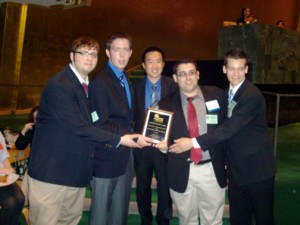
KFC with Best Delegation Winners
I wrote in my post on How to Build a Top Travel Team that the formula to creating a top travel team looks like this:
Top Travel Team = Competitive Strength x Size x Financial Stability
In this post, I’ll explain why each area is important, and how your team can improve its competitive strength, increase its size, and maintain financial stability.
Competitive Strength
Your team is judged by how well it performs in committee and how many awards you win. Your competitive strength depends on the conferences you attend, so the key to improvement is attending the right conferences for your team.
New delegates need to build confidence. Try to take them to small, one- or two-day conferences that attract smaller schools and other new delegates. Let them practice with experienced delegates in a non-competitive setting (e.g. mock sessions). Expose them gradually to large, three- or four-day conferences and faster-paced committees (e.g. Security Council, crisis simulations). Help them grow by focusing on specific Model UN skills to work on.
Experienced delegates need to test their skills. They should try to attend large, national-level conferences and participate in advanced committees. Give them a chance to show their mettle against other experienced delegates.
You want to attend conferences where your team stands a fair chance of winning awards, but also challenges them to grow competitively. Once your team wins awards consistently at less competitive conferences, it’s time to add more advanced conferences into your schedule. Think of it as a varsity sport – when your program repeatedly dominates a lower division, it’s time to move up.
Size
Large teams gain several advantages due to their size. They get better country assignments because conference organizers believe they have more qualified delegates to fill those roles. They are able to stack multiple delegates in each committee who can help each other, whereas smaller teams do not have that luxury. In the long-run, large teams provide their delegates with greater exposure to different countries and topics, giving each delegate increased knowledge of topics, policies, and previously proposed solutions.
This puts small teams at a disadvantage, but it can be minimized with careful conference selection. If your team is small, attend a conference with smaller committees. This allows each delegate more opportunities to stand out. In addition, some programs field a small team on purpose with the goal of winning Best Small Delegation. They are able to turn their small size from a disadvantage into an advantage by focusing on the other areas of the formula — Competitive Strength and Financial Stability.
Financial Stability
Your team’s Financial Stability impacts both its Competitive Strength and Size.
Selecting conferences that are too expensive to attend (e.g. a travel conference) prevents you from fielding many of your delegates, including top performers, if they are priced out from attending.
On the other hand, selecting too many conferences to attend can strain financial resources or fundraising efforts, which prevents your best delegates from participating consistently.
You want to send a strong team to as many conferences as possible. This means understanding the financial situation of the team members as well as fundraising opportunities scheduled throughout the year.
At the college level, the ability to subsidize travel costs through grants, departmental funding, or income generated from hosting a conference are key drivers to financial stability. In turn, this allows the program to field consistently strong travel teams.
* * *
The definition of a top travel team is also relative to different conferences. Your team can be considered top-notch at a local conference or a regional circuit. But, to be a top travel team at highly prestigious and national-level conferences means compounding Competitive Strength, Size, and Financial Stability over several years.
Advisors and Head Delegates need to ask themselves three questions:
- How is my team doing in each of these three categories?
- Where would I realistically like to be in the near future?
- What strategies can I use to help my team get there?
Which area does your team need to improve on most to become a top travel team? Leave a comment!
Photo Credit: Northeast Catholic High School

